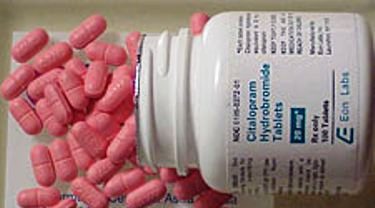
Search
Statistics
We have 222 registered usersThe newest registered user is raheelmemon
Our users have posted a total of 1140 messages in 613 subjects
If you are seeing this, you have attempted to link to the UpToDate widget but are experiencing a problem. Please visit UpToDate for more information.

Celexa (citalopram hydrobromide): Abnormal Heart Rhythms Associated With High Doses
FORUM FOR PSYCHIATRY RESIDENTS :: Psychiatry :: Psychiatry-Neurology-Psychology discussion :: Psycho-Pharmacology
Page 1 of 1
 Celexa (citalopram hydrobromide): Abnormal Heart Rhythms Associated With High Doses
Celexa (citalopram hydrobromide): Abnormal Heart Rhythms Associated With High Doses
FDA MedWatch - Celexa (citalopram hydrobromide):
Drug Safety Communication - Abnormal Heart Rhythms Associated With High Doses
AUDIENCE: Psychiatry, Cardiology
ISSUE: FDA notified healthcare professionals and patients that the antidepressant Celexa (citalopram hydrobromide) should no longer be used at doses greater than 40 mg per day because it can cause abnormal changes in the electrical activity of the heart. Changes in the electrical activity of the heart (prolongation of the QT interval of the electrocardiogram [ECG]) can lead to an abnormal heart rhythm (including Torsade de Pointes), which can be fatal. Patients at particular risk for developing prolongation of the QT interval include those with underlying heart conditions and those who are predisposed to low levels of potassium and magnesium in the blood.
Studies did not show a benefit in the treatment of depression at doses higher than 40 mg per day. Previously, the citalopram drug label stated that certain patients may require a dose of 60 mg per day. The citalopram drug label has been revised to include the new drug dosage and usage recommendations, as well as information about the potential for QT interval prolongation and Torsade de Pointes. See the FDA Drug Safety Communication Data Summary for additional information.
BACKGROUND: Celexa (citalopram hydrobromide) is in a class of antidepressants called selective serotonin reuptake inhibitors (SSRIs).
RECOMMENDATION: Citalopram causes dose-dependent QT interval prolongation. Citalopram should no longer be prescribed at doses greater than 40 mg per day. Citalopram should not be used in patients with congenital long QT syndrome. Patients with congestive heart failure, bradyarrhythmias, or predisposition to hypokalemia or hypomagnesemia because of concomitant illness or drugs, are at higher risk of developing Torsade de Pointes. See the FDA Drug Safety Communication for additional recommendations for healthcare professionals and patients.

Drug Safety Communication - Abnormal Heart Rhythms Associated With High Doses
AUDIENCE: Psychiatry, Cardiology
ISSUE: FDA notified healthcare professionals and patients that the antidepressant Celexa (citalopram hydrobromide) should no longer be used at doses greater than 40 mg per day because it can cause abnormal changes in the electrical activity of the heart. Changes in the electrical activity of the heart (prolongation of the QT interval of the electrocardiogram [ECG]) can lead to an abnormal heart rhythm (including Torsade de Pointes), which can be fatal. Patients at particular risk for developing prolongation of the QT interval include those with underlying heart conditions and those who are predisposed to low levels of potassium and magnesium in the blood.
Studies did not show a benefit in the treatment of depression at doses higher than 40 mg per day. Previously, the citalopram drug label stated that certain patients may require a dose of 60 mg per day. The citalopram drug label has been revised to include the new drug dosage and usage recommendations, as well as information about the potential for QT interval prolongation and Torsade de Pointes. See the FDA Drug Safety Communication Data Summary for additional information.
BACKGROUND: Celexa (citalopram hydrobromide) is in a class of antidepressants called selective serotonin reuptake inhibitors (SSRIs).
RECOMMENDATION: Citalopram causes dose-dependent QT interval prolongation. Citalopram should no longer be prescribed at doses greater than 40 mg per day. Citalopram should not be used in patients with congenital long QT syndrome. Patients with congestive heart failure, bradyarrhythmias, or predisposition to hypokalemia or hypomagnesemia because of concomitant illness or drugs, are at higher risk of developing Torsade de Pointes. See the FDA Drug Safety Communication for additional recommendations for healthcare professionals and patients.

 Similar topics
Similar topics» Evaluation of the FDA Warning Against Prescribing Citalopram at Doses Exceeding 40 mg
» Daily Melatonin Administration Attenuates Age-Dependent Disturbances of Cardiovascular Rhythms.
» SSRIs and Risk of Abnormal Bleeding
» Q: Which of the Following is Responsible for High Lamotrigine Levels?
» Video: Abnormal Involuntary Movement Scale (AIMS)
» Daily Melatonin Administration Attenuates Age-Dependent Disturbances of Cardiovascular Rhythms.
» SSRIs and Risk of Abnormal Bleeding
» Q: Which of the Following is Responsible for High Lamotrigine Levels?
» Video: Abnormal Involuntary Movement Scale (AIMS)
FORUM FOR PSYCHIATRY RESIDENTS :: Psychiatry :: Psychiatry-Neurology-Psychology discussion :: Psycho-Pharmacology
Page 1 of 1
Permissions in this forum:
You cannot reply to topics in this forum

» L-Methylfolate: Who Will benefit
» Vitamins & Supplements in Clinical Practice.
» Imaging Biomarkers for Outcomes in Mild TBI
» Q.5 Clozapine Neutopenia
» Treating Disorders!
» Cortical Abnormalities in Adults & Adolescents with MDD
» Efficacy of Antipsychotics in Pediatric Acute Mania
» Obsessive Compulsive Disorder in Adults: Which Treatment is Better?